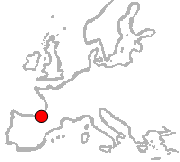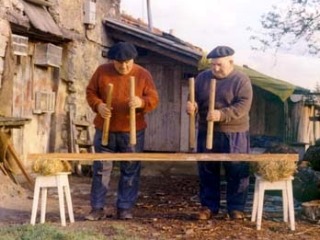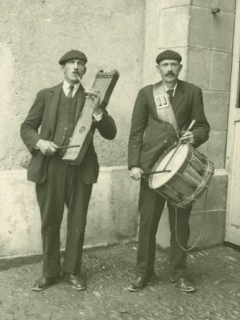
![]() San Sebastián is a city of 450,000 inhabitants located on the Atlantic coast of the Spanish Basque Country (Euskadi), which keeps one of the best standards of living in the whole Iberian Peninsula. The name of this city in the Basque language (Euskera) is Donostia. For the last decades it has regularly hosted remarkable cultural events such as the Jazz Festival (Jazzaldia) and the International Film Festival (Zinemaldia). The city was chosen as 2016’s European Capital of Culture (shared with the city of Wrocław, Poland)[59] with the motto: "Waves of people's energy", which summarizes the message: people and movements of citizens are the real driving force behind transformations and changes in the world.
San Sebastián is a city of 450,000 inhabitants located on the Atlantic coast of the Spanish Basque Country (Euskadi), which keeps one of the best standards of living in the whole Iberian Peninsula. The name of this city in the Basque language (Euskera) is Donostia. For the last decades it has regularly hosted remarkable cultural events such as the Jazz Festival (Jazzaldia) and the International Film Festival (Zinemaldia). The city was chosen as 2016’s European Capital of Culture (shared with the city of Wrocław, Poland)[59] with the motto: "Waves of people's energy", which summarizes the message: people and movements of citizens are the real driving force behind transformations and changes in the world.
The City of Donostia / San Sebastian

San Sebastián (Spanish: [san seβasˈtjan]; French: Saint-Sébastien) or Donostia (Basque: [doˈnos̺tia]) is a coastal city and municipality located in the Basque Autonomous Community, Spain. It lies on the coast of the Bay of Biscay, 20 km (12 miles) from the French border. Capital city of the province of Gipuzkoa, the municipality's population is 186,409 (2012), with its metropolitan area reaching 436,500 (2010). Locals call themselves donostiarra (singular), both in Spanish and Basque. The main economic activities are commerce and tourism, and it is one of the most famous tourist destinations in Spain.
Some key places to visit along San Sebastian’s sea side are:
2016 European Capital of Culture
Back in the late 1980s, the expansion of the European Union and the falling of the Berlin Wall in 89, started to rise optimistic perspectives that reached a new level once the Euro was established as a common currency in 2002 (in 12 member states). However, just seven years later already existing skepticism about this whole project strengthened even more during the Eurozone financial crisis.
But in latest years Europe has been facing other sort of outstanding challenges: military, humanitarian, social, security, environmental, climatic,... , maybe as threatening as those already experienced during the Cold War era. Same as it happened after attacks such as those in Madrid (2004), London (2005, 2007), Paris (2013, 2015),..., daily life in our continent must go on, and cultural life is probably the best indicator that our society can still maintain a very healthy standard of living.
Same as every year, in 2016 there will be two cities designated as European Capitals of Culture :
San Sebastian : In the Heart of the Basque Country
The Basque Country is a group of provinces placed just in the corner where France and Spain face the Atlantic Ocean (the Bay of Biscay). The Spanish Basque Country is formed by the three provinces of: Alava (capital city: Vitoria), Vizcaya (capital: Bilbao), and Guipuzcoa (capital: San Sebastián). Across the border with France, there is also the region of Aquitaine, whose south fringe also keeps some ethnical & cultural bonds with the Spanish side of the Basque territories. We are talking about lands facing the Atlantic Ocean, with many hills and valleys getting plenty of rain during the whole year, thus meaning rivers, forests, green fields,… Those are quite characteristic landscapes for northern Spain, which you can also find in the three regions located at the west of the Basque Country: Cantabria, Asturias and Galicia.

But what makes the Basque Country unique (not just in Spain but also in the whole of Europe), is that its aboriginal population is one of the oldest ethnical groups in the whole continent, and they still speak one of the three most ancient European languages: Euskera. The other two oldest are Hungarian and Finish, and the three are considered to exist in Europe since earlier times than any of the commonly known Indo-European groups of languages: Celtic, Greek, Latin, Nordic, Germanic, Slavic,…
Modern times are making ancient lifestyles disappear quite rapidly everywhere. The Basque people are very proud to still maintain many old traditions related to all aspects of human life: agriculture, animal husbandry, architecture, woodworking, fishing, sailing, sports, singing, music playing, dancing,…. An example of Basque traditional sports are the races of ‘trainera’ rowing boats which take place not in rivers but in open sea. Their origins are traced back to the very early times of whaling, when Basque ships used to go sailing for long journeys, travelling to distant places such as Iceland or even Terranova (Canada).
One of the Basque people’s true passions is food, cooking. The Basque cooks have always been in the forefront of Spain’s cuisine. The exceptional conditions of the Basque lands, for fishing and agriculture, and the very close links with their French neighbors have favored the development of a solid activity in gastronomy. When you come to central and southern Spain looking for street food, you ask for tapas. But when you go to the Basque Country you have to ask for ‘pintxos’, small treats of very creative cuisine on top of a slice of bread. And when you look for a formal lunch or dinner, you will not get at all disappointed by their expertise on beef roasting or fish stewing. The traditional drinks are cider, txacoli (local white wine), but you will always find all of the best reds from the surrounding regions, mostly from La Rioja.
Basque Identity

It is commonly understood that the Basque Country was one of those few southern European territories where the invasion by the Roman legions, and the establishment of the Roman power and Latin language as part of the new rule, never succeeded completely and kept the Basque tribes somehow aside from the cultural evolution that was taking place in the rest of Spain, France & Portugal. Later, in the Middle Ages the Basque Country (as well as Galicia, Asturias, Cantabria) also received less influence than Central & Mediterranean Spain, from the Arab occupation that started from the south of Spain in 711 A.C., and ended in 1492 with the conquest of the last Muslim stronghold in the Iberian peninsula: the city of Granada.
The clear recognition of their well differentiated language, as well as their peculiar rural traditions and lifestyle, has always provided the Basque people a strong sense of national identity.
Neighbours & Brothers : Navarra
Spain’s Autonomous Community just at the east of the Basque Country is Navarre (Nafarroa in Basque). Since ancient times (which means earlier than the arrival of the Roman legions in today’s Spain, in 218 BC), today’s Navarra was one of the main regions where the tribe of the Vascones were settled. Together with the tribes of the Varduli, the Caristi, the Autrigones, the Berones, the Tarbelli, the Sibulates,… (settled in today’s Basque Country and surrounding provinces), they are considered the ancestors of today’s Basque aboriginal population.
The Roman occupation of today’s Basque-Navarre territory (circa 178 BC), was centuries later followed by the arrival of their invaders and foederati, the Visigoths (in the 5th century AC). Successive historical events of relevance were for example: the establishment of the Duchy of Gascony/Vasconia (602), the fighting against the Franks (8th century), Spain’s invasion by the Berbers & Arabs (711), the foundation of the Kingdom of Pamplona (later known as Kingdom of Navarre) by Íñigo Arista in 824, King Sancho Garcés I (905-925) and his successors, the connection with the Kingdom of France (until 1328), the conquest by Ferdinand the II (King of Aragón & Regent of Castille) starting in 1512, the Treaty of the Pyrenees (1659) which upheld actual Spanish and French territorial control and determined the fate of vague bordering areas, Spanish King Philip V and the creation of the Royal Guipuzcoan Company of Caracas (1728), the French Revolution and its centralizing power effect over the northern part of the Basque Country & Navarre (1793), Napoleon’s army entry in Spain (1808), Spain’s war of independence from France, the restoration of Spain’s monarchy with Ferdinand VII, the 1812 liberal Constitution, the three Carlist wars, the industrial revolution and the development of coal mining & iron furnaces in Biscay, the birth of Basque nationalist movements in the 19th century, Spain’s Second Republic (1931), the Spanish Civil War (1936-1939), General Franco’s dictatorship (1939-1976), Spain’s 1978 democratic Constitution, etc etc...
All those periods continuously reshaped the society, the local administrations and the borders of these territories. But regardless of all political evolutions and how the frontiers shifted in one direction or the other, Spain’s Autonomous Communities that we know today as the Basque Country and Navarre, maintained close relationships with each other due to the common culture of their rural populations, which shared significant traits from their ancient Basque origins.
Traditions & Folk Music
Today’s Basque & Navarre folk music is the spin-off of centuries of evolution in their peculiar traditions on poetry, singing, dancing & instrument playing. It is true that in the past century, such folkloric expressions have achieved less popularity in Spain, than those others coming from Andalusia or Galicia. But it is also true that since the 1960s & 70s there have been musicians who have adapted those traditions into a modernized folk music style, thus becoming exceptional ambassadors of the Basque popular music all over Spain and abroad. The following sections will briefly list two main aspects of the Basque-Navarre music: local traditional instruments & folk artists.
Traditional Musical Instruments
Music Artists
There are a large number of Basque & Navarre artists that have developed their folk music since the 1960s revival. Besides the most famous ones such as Benito Lertxundi, Mikel Laboa, Oskorri, or Kepa Junkera, there are also lots of singers and bands that continue emerging year after year. Many of them have been already covered in previous FolkWorld articles & CD reviews as summarized in the list below.
Photo Credits:
(1) View of San Sebastian’s La Concha Bay from the top of Monte Igueldo (by P. Fernández);
(2) Map: San Sebastián/Donostia,
(3) Aintzina: Kosinatik kanberala,
(4) San Sebastián/Donostia 2016,
(5) Txalaparta,
(6) Ttun-ttun,
txirula & atabal,
(7) Alboka,
(8) Kepa Junkera,
(9) Korrontzi (unknown/website).